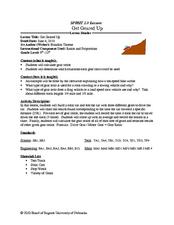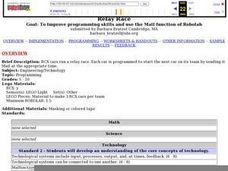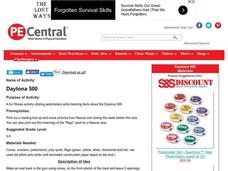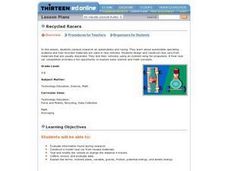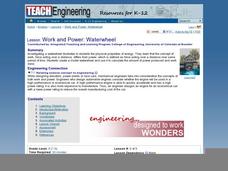Illustrative Mathematics
Buying Bananas, Assessment Version
Practice with unit rates, proportions, and ratios when Carlos purchases an amount of bananas. Learners must interpret a graph to decide whether points on the same line represent similar proportional relationships. Use with lesson plans...
Kenan Fellows
The Newton Challenge
Make Newton proud. Scholars apply their understanding of forces and energy to an engineering design challenge. They learn about simple machines, create a presentation on Newton's laws, and develop a balloon-powered car.
Curated OER
Newton in Motion Project
Students investigate Newton's Third Law of Motion as it exits in real world applications. They watch as the teacher makes a simple balloon powered car before explaining how the motion of the car demonstrates Newton's Third Law of Motion....
Curated OER
Get Geared Up
Middle schoolers calculate gear ratio as they solve word problems. They discuss and find slopes as they relate to real life. Additionally, they hey use ratio and proportion to make predictions and solve problems.
Curated OER
Relay Race
Students program RCX cars to relay information to one another via Mail when triggered by light sensors. The light sensors are appropriately spaced to allow for timed triggers.
Curated OER
Coin Crossroads
Students play a racetrack game using money vocabulary and adding coins with the same value. They read car racing stories and observe the reverse of the Indiana quarter. They locate Indiana on a map.
Curated OER
Daytona 500
Students use pedometers to help track distance goals while participating in a team scooter race modeled after the Daytona 500.
Lied Center of Kansas
The Ugly Duckling and The Tortoise and the Hare
Both The Ugly Duckling and The Tortoise and the Hare are great additions to an elementary language arts lesson. Young readers focus on the literary elements of each story, including characters and plot development, and apply counting and...
Curated OER
Recycled Racers
Young scholars research automobile operating systems in relation to racing. They design and construct vehicles from recycled material which they race to study the concept of propulsion.
Curated OER
It's a Drag!
Students create number lines using decimals and whole numbers. In this algebra lesson, students graph and solve linear equations. They plot ordered pairs on a coordinate plane correctly.
Curated OER
Playing With Probability
Students rotate through work stations where they compute problems of theoretical and experimental probability. In this probability lesson plan, students use simulations of a lottery system.
Curated OER
Slippery Slope
Students define patterns, relation and function. In this algebra lesson, students find the slope of a line and write equations of line. They model the slope using real life scenarios.
Curated OER
GPS Receiver Basics
Middle schoolers practice using a GPS receiver. They walk in different directions and monitor their progress on maps. They enter specific locations and use information given to them to get them back to their original locations.
Curated OER
Work and Power: Waterwheel
Students investigate a waterwheel and the physical properties of energy. In this waterwheel lesson students create a model waterwheel and calculate the amount of power produced.
Curated OER
How Do Things Fall?
Students observe falling objects. They discover the rate of falling is based on air resistance and not the weight of the objects. They discuss how engineers use this type of information to design aerodynamic shapes.





